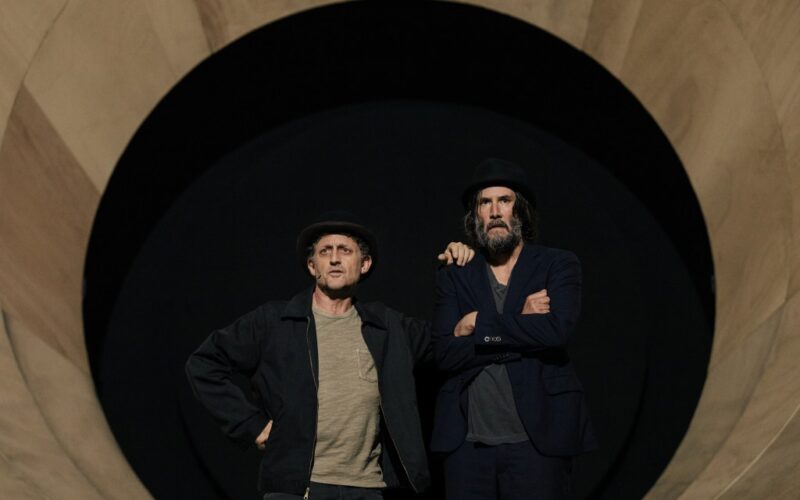There is a certain existential deliciousness to Keanu Reeves and Alex Winter, the two stars of the existential cinematic masterpiece known as “Bill and Ted’s Excellent Adventure” appearing on Broadway, some 36 years later, across from each other in the motherlode of absurdism, “Waiting for Godot.” As Samuel Beckett’s Estragon famously observes, “We always find something, to give us the impression we exist.”
The two works have a certain commonality: Samuel Beckett could have coined “Strange things are afoot at the Circle K,” had the time and place of his birth been different. “Be excellent to each other” perhaps would have offended with its sentimentality but Beckett would have admired “All we are is dust in the wind, dude” for both its accuracy and its colloquial concision.
Reeves, of course, sped on to become an action hero and you can’t look around the crowd at the Hudson Theatre without wondering what those audience members attracted by Reeve’s signature roles in “The Matrix” franchise will make of this famously oblique drama, composed of two oldish tramps waiting who knows where for He Who Never Comes, despite sending a kid as a messenger from God’s knows where.
Quips, bon mots and repartee pass the time as do appearances by a loquacious taskmaster, Pozzo, and an allegedly dumb servant, Lucky, played respectively by Brandon J. Dirden and the consistently fascinating Michael Patrick Thornton, whose Lucky spends a chunk of the show in a brutalizing mask.
Maybe they will feel at home with the resonances. “The Matrix” relies on a simulated reality; Beckett just happened to be one of the first and best to posit that there really is no other kind.
The British director Jamie Lloyd (“Sunset Blvd.”), as savvy and splashy and insouciant a pop-culture translator and mediator as the dull old theater has seen in a while, certainly is aware of all that. Soutra Gilmore’s set for Lloyd’s “Godot” looks like a giant concrete cylinder of the kind you might find in an aging power plant or a nuclear bunker. But it can also morph into a giant iris or, most amusingly, as the doppelganger of the famed title sequence for the James Bond movies, a nod perhaps to our obsession with sequels and prequels all the other detritus of myth-based storytelling. You could, of course, argue that the first three letters of Godot are the biggest franchise of all time.
It’s an interesting evening, this “Waiting for Godot,” spent in the company of very capable actors, for sure. Lloyd certainly has blown some cobwebs off a play that long has confounded anyone who has tried to sell it to regular folks. Famously and disastrously, the first U.S. production of “Waiting for Godot” (starring Bert Lahr and Tom Ewell) ended up at the Coconut Grove Playhouse in Miami, where it was billed as “the laugh sensation of two continents” and thus met mostly by confused audiences who wanted not so much to meet Godot (sorry) as to get their money back. They didn’t know or care they were seeing one of the most important plays of the 20th century.
That won’t happen at the Hudson Theatre. Instead of the traditional idea of ancient vaudevillians twisting in a cruel wind blowing in from the wings, fighting to be heard in the theater over their own ennui, Lloyd’s “Godot” uses microphones and cultivates intimacy, even persuading the audience to play along with Vlad and Esty, Pozzo and Lucky. The Beckett estate certainly allowed some liberties. There is no tree in the usual sense of a tree and the country road of the script has to live in the eye of the mind.

Reeves and Winter have a genuine rapport, the laconic former being generally passive, but responsive and likeable, and the genial latter keeping the questions and what passes for action coming. One problem with microphones, of course, is the temptation towards a kind of studied but isolated loquaciousness, something that afflicts everyone here other than Thornton, and especially Birden. On the other hand, these are the halcyon days of the podcast and this surely is a “Waiting for Godot” for the podcast age.
Frankly, it’s hard to believe anyone in the theater will crave another half hour beyond the available two and I doubt this revival will loom large in anyone’s long-term memory, notwithstanding the plethora of interesting takes. But then “Godot” is “Godot” and the absurd is circuitously enigmatic in its appeal. And if you were hoping here for the usual tragicomedy of the tears of a clown (the modus operandi of the previous, open-hearted “Godot” revival with Steve Martin and Robin Williams), you won’t get what you expect. This is a cooler, more removed and inarguably more complicated experience. Fair enough. Vaudeville is dead and this is the age of Ezra Klein.
Certainly, the existential chills remain very much present in this “Godot,” maybe because of my growing older and hardly wiser: As they say in “The Matrix,” “there’s a difference between knowing the path and walking the path.” Yup.
The character known only as The Boy (played most excellently at my performance by Eric Williams) is the very creepiest kind of ghost and sent more than a few shivers down my spine whenever he showed up, the whites of his eyes glowing, to remind everyone that the much hoped for Godot at the end of a long wait so often seems to have another pressing engagement.








